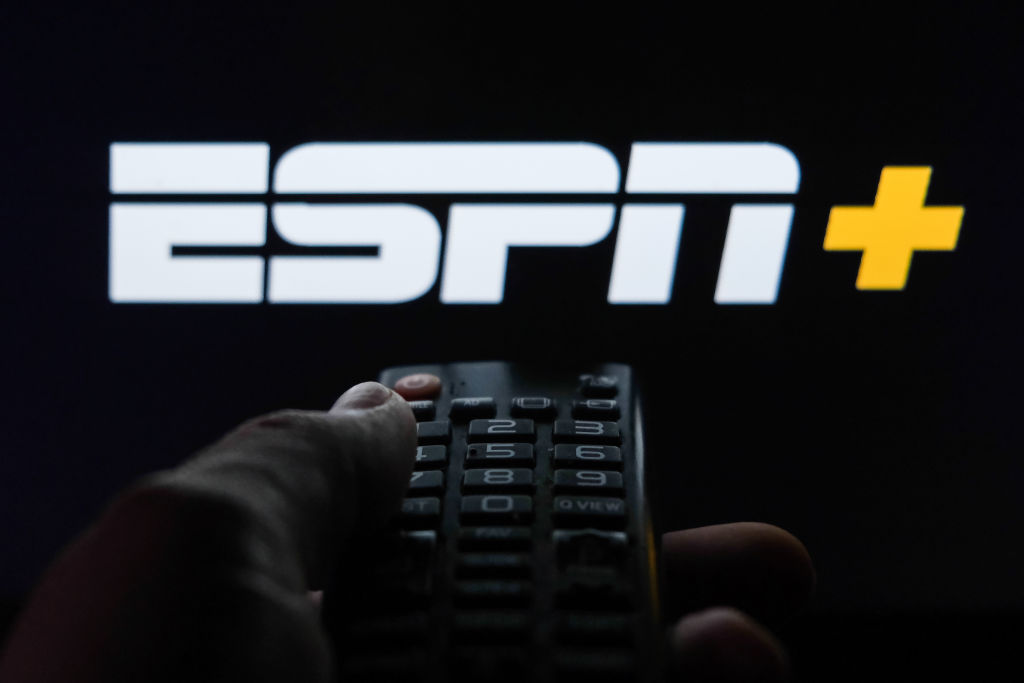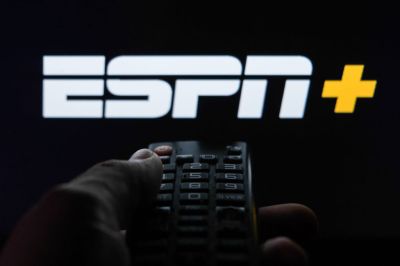Multiple media companies announced a new sports-focused streaming joint venture earlier this month that could further inflame ongoing changes in the entertainment industry.
On February 6, Disney, Fox Corp., and Warner Bros. Discovery announced plans to collect all their sports programming under the same umbrella and make it accessible to ESPN+, Hulu, and Max subscribers. The new unnamed standalone app is slated to launch in late 2024, but no price tag has yet been announced.
The deal will consolidate thousands of broadcasts for the NFL, NBA, MLB, NHL, NCAA, WNBA, PGA Tour, FIFA, UFC, NASCAR, Formula 1, and more. It also represents another way streaming is cutting in on more traditional sports broadcasting: In 2021 Amazon Prime Video purchased the exclusive broadcast rights to Thursday Night Football through 2033. Peacock similarly exclusively broadcast a NFL wild card playoff between the Miami Dolphins and Kansas City Chiefs on January 13. YouTubeTV, meanwhile, purchased the rights to NFL’s Sunday Ticket for $2 billion.
What the merger could mean for cable and streaming.
Despite a decade of growth and the benefit of having captive audiences during the COVID-19 pandemic, streaming companies have proven to be consistently unprofitable. Every major streaming service has seen losses in the past several years, thanks to waves of subscriber turnover and low profit margins. The new sports merger comes as companies are trying new approaches to growing revenue through their subscription services, while traditional cable packages struggle to maintain their relevance.
The strength of this sports merger may be that up to this point, “cutting the cord” and switching to streaming services has meant piecing together individual services—especially with sports—to get complete access to channels offered on traditional cable packages. But those individual subscriptions add up, and the merger takes a page from traditional cable companies’ playbook.
“The whole idea was you used to buy a cable bundle because of the economy behind it—the tennis channel wouldn’t exist if you didn’t have to pay for a whole bundle,” AEI senior fellow Shane Tews told The Dispatch. “Or if you want some specific tier or package you’d pay more. The No. 1 reason people upgrade their cable packages is because they want live sports … but now the different variations on these bundles get expensive. How much do you want to pay for individual packages? And that's where the ESPN package would make a difference.”
CNBC reports that individuals familiar with the merger’s details believe it will be a disruptive “monster” for traditional broadcast services like DirecTV, Charter, and Comcast that could draw more traditional sports fans to streaming.
But given that the app’s price is not yet available and that major events will continue broadcasting on traditional cable television, it remains unclear how many people are likely to cut the cable for a service that could cost between $30 and $50 per month when ESPN and Fox Sports are still conveniently available from traditional cable providers. The package may appeal more to pre-existing cord-cutters than it does current cable subscribers.
Can sports save cable?
The merger does not mean that traditional broadcasting is going away or that existing sports bundles will no longer be available on those platforms, at least for the foreseeable future.
Traditional broadcasting still has the upper hand at the moment in sports broadcasting, and executives aren’t convinced major events will move to streaming-only platforms anytime soon—beyond specific sports events that have migrated to Amazon Prime Video and YouTubeTV. This isn’t surprising, given that the most recent Super Bowl was a $17 billion event with nearly 124 million viewers.
“One of the secrets of our success is we are really committed to broadcast television. Ninety percent of our games are on broadcast television. I think it’s the reason why you will see over 200 million people watch this game here in the United States—because it's on broadcast television and the broadest possible platform,” NFL commissioner Roger Goodell recently said.
Convenient access to sports may be one of the only things keeping people from cutting their cable. The overall trajectory of cable services continues to be in sharp decline, with streaming overtaking cable viewing in 2023 and ad revenue declining 4.9 percent last year. The number of homes with cable packages has decreased from 73 percent in 2017 to 46 percent in 2023.
The future of streaming.
Netflix may be the streaming service with the most subscribers, but even the most successful companies in the streaming space are continuing to struggle. While it remains unlikely that large streaming services like Netflix, Amazon Prime, and Disney+ will go away anytime soon, the industry is likely facing continued consolidation, layoffs, reduced original programming, and restructuring.
In light of a range of financial problems across the industry, streaming services are also working to find new sources of revenue. Amazon Prime Video began releasing its films in movie theaters before moving to streaming and has seen great commercial success with films like Creed III grossing $275.3 million in the box office. Most companies have already begun cracking down on password sharing.
This process could face an uphill battle, as increasing prices, reducing the number of exclusive series on these services, and implementing advertising on lower tiers of service could displease customers and reduce the overall quality of these services. The recent controversies surrounding Max canceling fully completed films like Batgirl and Coyote vs. ACME for tax breaks have also drawn negative attention to the companies.
Bundling may be the future.
Streaming services have already begun to operate more like traditional cable, charging more for users who don’t want to pay for commercial breaks, higher rates, and bundles of multiple services.
As the Wall Street Journal reported last week, Paramount+ has already begun talking with other streaming services about potential mergers and streaming bundles, including discussions with Max, Peacock, and AppleTV+. HBO Max already merged with Discovery+ last year and Disney may merge its Disney+ and Hulu apps and content this year, the latter of which it owns a stake in.
The current goal of the industry is to reduce “churn,” or the number of people who sign up for services and then cut them, Adweek reports. While some of these early attempts to crack down on issues and increase prices have resulted in hemorrhaging subscribers, many of these programs have worked. Netflix’s password crackdown resulted in 30 million new subscribers in 2023.
Bundles and mergers, such as the prospective merger between Disney, Fox Corp., and Warner Bros. Discovery, could serve to stabilize the industry, provide convenient options that keep people subscribed, and shift the way audiences consume content. Given audience preferences for convenient access, a bundle could change the way consumers access sports content.
Antitrust questions surface.
At least the newest merger plan will face court challenges. Last week FuboTV, a competing streaming service, filed an antitrust lawsuit against the companies involved in the merger in the Southern District of New York. FuboTV asked the court to shut the merger down and is seeking billions in punitive damages for these companies coordinating to steal its prospective idea of merging streaming services—stymying FuboTV through “anti-competitive business practices” and exclusionary licensing fees and claiming that the potential monopoly over the sports market would harm customers.
FuboTV has also suffered a 41.4 percent stock devaluation in the days after the merger announcement.
But a key question in the lawsuit will be how much of an antitrust issue is at play beyond the damages FuboTV stands to suffer as a direct competitor. “It’s a win for consumers, which is primarily what the antitrust laws are concerned with,” attorney Chris Deubert told Awful Announcing. “It’s another option, no one has to buy it… I’m struggling to see where it would be bad.”





Please note that we at The Dispatch hold ourselves, our work, and our commenters to a higher standard than other places on the internet. We welcome comments that foster genuine debate or discussion—including comments critical of us or our work—but responses that include ad hominem attacks on fellow Dispatch members or are intended to stoke fear and anger may be moderated.
With your membership, you only have the ability to comment on The Morning Dispatch articles. Consider upgrading to join the conversation everywhere.